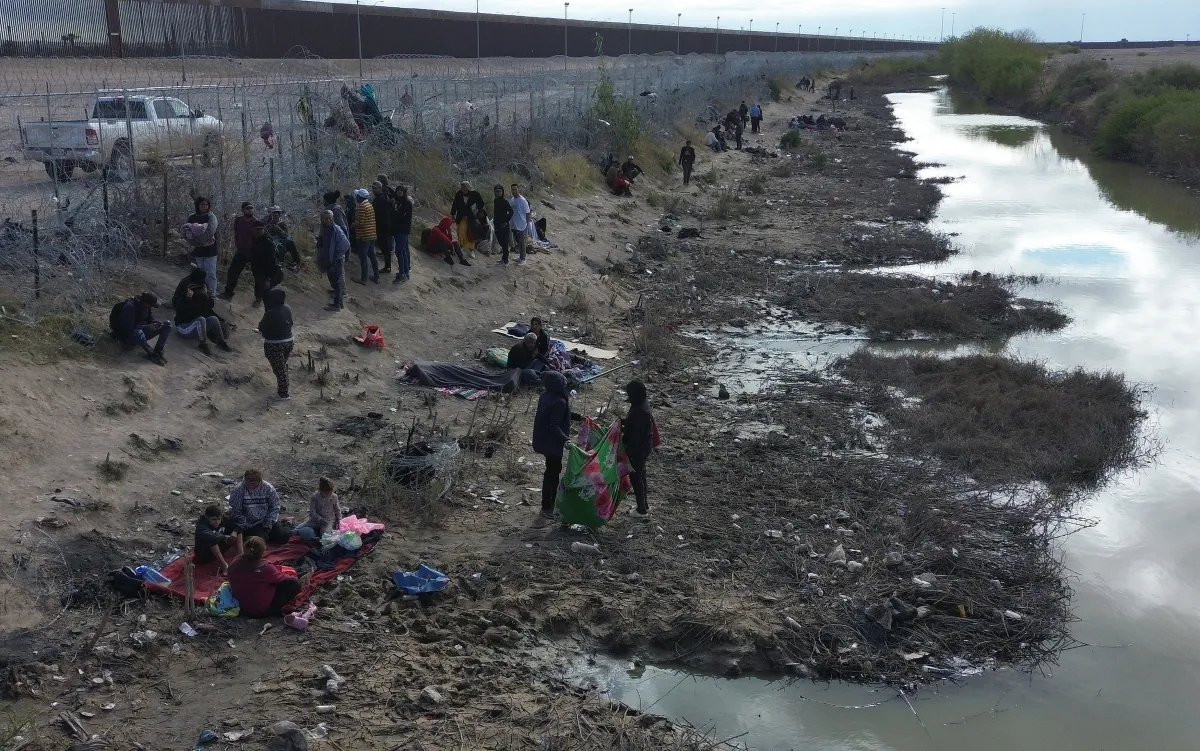International
Keys to the anti-immigrant law of Texas and states that follow its example

The Texas SB-4 law, considered one of the most drastic anti-immigrant measures in the history of the United States along with the SB-1070 of Arizona of 2010, has raised the tension in the border area of the United States and Mexico and has inspired other states of Republican governments to follow in its footsteps.
In the midst of the complicated legal battle between the state and federal governments, which prevented this measure from entering into force on March 5, uncertainty grows among undocumented immigrants, and also legal immigrants, because it lends itself to racial discrimination.
The measure, promoted by the governor of Texas, Republican Greg Abbott, makes it a misdemeanor that a foreigner “enters or attempts to enter the state from a foreign nation” irregularly. The detained migrant will be accused of a misdemeanor, which carries a penalty of up to six months in prison.
If the offender is a repeat offender, the offense becomes a serious crime, punishable by up to 20 years in prison.
The law allows the state Justice (different from immigration judges) to order the expulsion of the foreigner without legal process. A judge could withdraw the charges if the migrant agrees to return to Mexico.
SB-4 also prohibits any local policy that restricts police officers from questioning a person’s immigration status, even during routine arrests such as at traffic stops, which are promoted in the so-called “immigrant sanctuaries.”
The measure requires local authorities to allocate resources such as prison space, agents and funds to implement the law.
The initiative prohibits the police from arresting immigrants in public or private schools, churches and other places of worship, and medical centers. However, it does not mention university campuses.
-Iowa: The House of Representatives of that state approved a bill on Tuesday. It would allow the police to arrest certain undocumented immigrants and order them to leave the country.
Undocumented immigrants could face up to two years in prison if they enter, attempt to enter or are found in Iowa, after they were denied entry to the United States or had been deported.
The measure is addressed to the desk of Governor Kim Reynolds, who has given her support to the legislation.
– New Hampshire: The Senate of that state approved at the beginning of the month a bill that allows the police to file charges of invasion of private property against people suspected of having illegally entered the United States from Canada. The initiative is currently being discussed in the House of Representatives of that state.
– Tennessee: Last Friday, lawmakers from the Lower House of Tennessee approved a bill that requires police officers to report to the Department of Homeland Security (DHS) that they have come across an undocumented person.
– Georgia, Florida, Louisiana and North Carolina: The legislatures of these states have approved or are discussing bills similar to Texan law. They impose harsh sanctions on the undocumented under the argument that they must act to contain the arrival of migrants.
– Arizona: The governor of that state, Democrat Katie Hobbs, has a measure on her table, dubbed the Arizona Invasion Law. It would criminalize immigrants by authorizing police departments to arrest and arrest foreigners who cross the border illegally.
This project, promoted by the Republicans and expected to veto Hobbs, would also grant immunity to the police and their departments from any legal action against them due to possible incidents that occurred while the law is being applied.
International
U.S. Senate Rejects Budget, Bringing Government Closer to Shutdown Amid DHS Dispute

The U.S. Senate voted on Thursday against a budget proposal in a move aimed at pressuring changes at the Department of Homeland Security (DHS), following the killing of two civilians during a deployment of immigration agents in Minneapolis.
All Senate Democrats and seven Republican lawmakers voted against the bill, which requires 60 votes to advance, pushing the country closer to a partial government shutdown that would cut funding for several agencies, including the Pentagon and the Department of Health.
The rejection came as Senate leaders and the White House continue negotiations on a separate funding package for DHS that would allow reforms to the agency. Proposed measures include banning Immigration and Customs Enforcement (ICE) agents from wearing face coverings and requiring them to use body-worn cameras during operations.
The vote took place just hours after President Donald Trump said he was “close” to reaching an agreement with Democrats and did not believe the federal government would face another shutdown, following last year’s record stoppage.
“I don’t think the Democrats want a shutdown either, so we’ll work in a bipartisan way to avoid it. Hopefully, there will be no government shutdown. We’re working on that right now,” Trump said during a Cabinet meeting at the White House.
International
Trump Says Putin Agreed to One-Week Halt in Attacks on Ukraine Amid Extreme Cold

U.S. President Donald Trump said on Thursday that he secured a commitment from Russian President Vladimir Putinto halt attacks against Ukraine for one week, citing extreme weather conditions affecting the region.
“Because of the extreme cold (…) I personally asked Putin not to attack Kyiv or other cities and towns for a week. And he agreed. He was very pleasant,” Trump said during a Cabinet meeting broadcast by the White House.
Trump acknowledged that several advisers had questioned the decision to make the call.
“A lot of people told me not to waste the call because they wouldn’t agree. And he accepted. And we’re very happy they did, because they don’t need missiles hitting their towns and cities,” the president said.
According to Trump, Ukrainian authorities reacted with surprise to the announcement but welcomed the possibility of a temporary ceasefire.
“It’s extraordinarily cold, record cold (…) They say they’ve never experienced cold like this,” he added.
Ukrainian President Volodymyr Zelensky later commented on the announcement, expressing hope that the agreement would be honored.
International
Storm Kristin Kills Five in Portugal, Leaves Nearly 500,000 Without Power

Storm Kristin, which battered Portugal with heavy rain and strong winds early Wednesday, has left at least five people dead, while nearly half a million residents remained without electricity as of Thursday, according to updated figures from authorities.
The revised death toll was confirmed to AFP by a spokesperson for the National Emergency and Civil Protection Authority (ANPEC). On Wednesday, the agency had reported four fatalities.
Meanwhile, E-Redes, the country’s electricity distribution network operator, said that around 450,000 customers were still without power, particularly in central Portugal.
Emergency services responded to approximately 1,500 incidents between midnight and 8:00 a.m. local time on Wednesday, as the storm caused widespread disruptions.
The Portuguese government described Kristin as an “extreme weather event” that inflicted significant damage across several regions of the country. At the height of the storm, as many as 850,000 households and institutions lost electricity during the early hours of Wednesday.
Several municipalities ordered the closure of schools, many of which remained shut on Thursday due to ongoing adverse conditions.
Ricardo Costa, regional deputy commander of the Leiria Fire Brigade, said residents continue to seek assistance as rainfall persists.
“Even though the rain is not extremely intense, it is causing extensive damage to homes,” he noted.
In Figueira da Foz, a coastal city in central Portugal, strong winds toppled a giant Ferris wheel, underscoring the severity of the storm.
-

 Central America5 days ago
Central America5 days agoGuatemala Police Arrest Prison Guard Caught in the Act of Extortion
-

 Central America5 days ago
Central America5 days agoHonduras swears in conservative president Asfura after disputed election
-

 Central America5 days ago
Central America5 days agoBukele leads public trust rankings as UCA survey highlights gains in security
-

 International4 days ago
International4 days agoFootball Fan Killed in Clashes After Colombian League Match
-

 Central America4 days ago
Central America4 days agoGuatemala President Says Starlink Terminal Found Inside Prison
-

 International5 days ago
International5 days agoDoomsday clock moves to 85 seconds before midnight amid rising global risks
-

 International5 days ago
International5 days agoWinter Storm Fern Leaves 30 Dead and Over One Million Without Power Across the U.S.
-

 International3 days ago
International3 days agoU.S. Senate Rejects Budget, Bringing Government Closer to Shutdown Amid DHS Dispute
-

 Sin categoría5 days ago
Sin categoría5 days agoEight Killed in Series of Armed Attacks in Ecuador’s Manabí Province
-

 International5 days ago
International5 days agoSpain approves plan to regularize up to 500,000 migrants in Historic Shift
-

 International4 days ago
International4 days agoMissing Spanish Sailor Rescued After 11 Days Adrift in Mediterranean
-

 International4 days ago
International4 days agoRubio Says U.S. Could Participate in Follow-Up Russia-Ukraine Talks
-

 Sin categoría5 days ago
Sin categoría5 days agoEl Salvador Launches Fourth Year of Ocean Mission to Protect Marine Ecosystems
-

 Central America2 days ago
Central America2 days agoPanama Supreme Court Strikes Down Panama Ports Concession as Unconstitutional
-

 International3 days ago
International3 days agoStorm Kristin Kills Five in Portugal, Leaves Nearly 500,000 Without Power
-

 Central America2 days ago
Central America2 days agoU.S. and Guatemala Sign Trade Deal Granting Zero Tariffs to Most Exports
-

 International3 days ago
International3 days agoTrump Says Putin Agreed to One-Week Halt in Attacks on Ukraine Amid Extreme Cold
-

 International3 days ago
International3 days agoMan Arrested After Vehicle Crashes Into Jewish Institution in Brooklyn






























